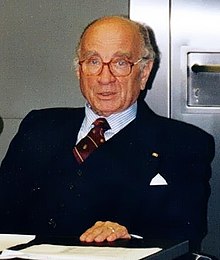Otto Graf Lambsdorff
| Otto Graf Lambsdorff | |
|---|---|

Otto-Graf-Lambsdorff in 2001
|
|
|
Federal Minister of Economics |
|
|
In office 7 October 1977 – 17 September 1982 |
|
| Preceded by | Hans Friderichs |
| Succeeded by | Manfred Lahnstein |
|
In office 4 October 1982 – 24 June 1984 |
|
| Preceded by | Manfred Lahnstein |
| Succeeded by | Martin Bangemann |
| Chairman of the FDP | |
|
In office 1988–1993 |
|
| Preceded by | Martin Bangemann |
| Succeeded by | Klaus Kinkel |
| Personal details | |
| Born |
Otto Friedrich Wilhelm Freiherr von der Wenge Graf Lambsdorff 20 December 1926 Aachen, Weimar Germany |
| Died | 5 December 2009 (aged 82) Bonn, Germany |
| Nationality |
|
| Political party | FDP |
| Spouse(s) | Renate Lepper (1953–1975) Alexandra von Quistorp (1995–2009) |
| Children | Nikolaus Graf Lambsdorff Cecilie Gräfin Lambsdorff Susanne Gräfin Lambsdorff |
| Alma mater |
University of Bonn University of Cologne |
| Occupation | Lawyer |
| Religion | Lutheran |
Otto Friedrich Wilhelm Freiherr von der Wenge Graf Lambsdorff, known as Otto Graf Lambsdorff, (20 December 1926 – 5 December 2009) was a German politician of the Free Democratic Party.
Lambsdorff was born in Aachen (Rhineland) to Herbert Graf Lambsdorff and Eva, née Schmidt. He attended school in Berlin and Brandenburg an der Havel and became an officer cadet in the Wehrmacht in 1944. In April 1945 he was severely wounded in an Allied strafe attack and lost his lower left leg. Lambsdorff was a prisoner of war until 1946. After World War II he passed his Abitur and studied law at the Universities of Bonn and Cologne where he obtained a PhD.
In 1951, Lambsdorff became a member of the liberal FDP, and from 1972 to 1998 he represented this party in the Federal parliament, the Bundestag.
Within and outside his party he was known as a representative of the market liberals; a mocking name was der Marktgraf ("the market count", a play on Markgraf, "margrave").
When Chancellor Willy Brandt made way for Helmut Schmidt in 1977, Lambsdorff was appointed West German Federal Minister of Economics in the new government and served from 1977 until 1982. He held the same office again from 1982 until 1984 in the government of Chancellor Helmut Kohl after his party pulled out of the coalition with the Social Democratic Party to form a new Government with Kohl’s Christian Democratic Union.
...
Wikipedia
